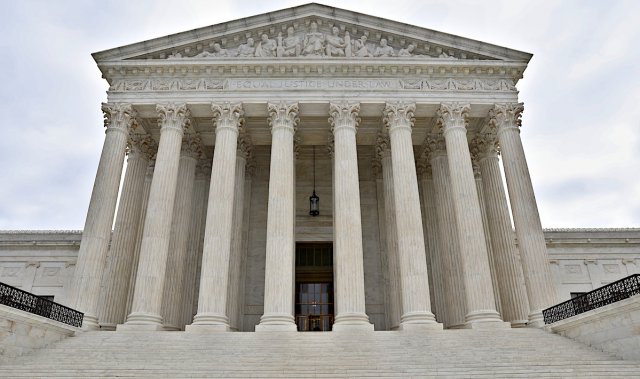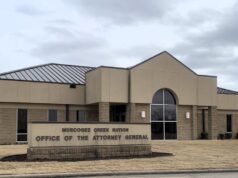
(Update: At 9 a.m. Thursday, July 9, the U.S. Supreme Court announced its ruling in McGirt v. Oklahoma, the case discussed below. Read the 5-4 decision in favor of McGirt here.)
In about 90 minutes of oral arguments before the U.S. Supreme Court this morning, state attorneys asserted that eastern Oklahoma is not today — nor has it ever been — a Native American reservation. The court heard arguments via teleconference in McGirt v. Oklahoma, a monumental case that could fundamentally alter local jurisdictions and overturn the convictions of more than 3,000 inmates, according to Mithun Mansinghani, Oklahoma’s solicitor general.
The case is nominally an appeal for Jimcy McGirt, a Seminole Nation citizen convicted in Wagoner County District Court of raping a minor. McGirt’s attorneys argue that the state of Oklahoma did not have jurisdiction to prosecute him on tribal land, a claim that could have far-reaching impacts on the jurisdiction of Oklahoma courts and the scope of tribal sovereignty.
The Supreme Court failed to reach a decision on that claim in a similar case last session, Sharp v Murphy, meaning a ruling of the Tenth Circuit Court of Appeals that state governments do not have jurisdiction in cases that occur on reservations still stands.
The McGirt case offers a chance for the Supreme Court to define the limits of tribal legal sovereignty after what many suspect was a 4-4 split in deliberating Sharp v Murphy. Justice Neil Gorsuch had recused in that case, having heard it prior to his appointment to the Supreme Court.
“Oklahoma has jurisdiction over the eastern half of the state because it was never a reservation and certainly is not a reservation today,” Mansinghani said in his opening remarks.
The problem at the heart of McGirt v Oklahoma has a long and winding history, deeply rooted in the complexities of Native American law and the tribes’ relationships with the federal government. The state of Oklahoma has asserted eastern Oklahoma is not an Indian reservation and should not be treated differently than the rest of the state. McGirt’s attorneys hold that the Creek reservation was established through treaties and never dissolved. The Creek, Chickasaw and Choctaw nations, U.S. Rep. Tom Cole (R-OK4), and former Gov. Brad Henry filed briefs in support of McGirt, while the Oklahoma District Attorneys Association and the City of Tulsa filed briefs in support of the state.
Monday morning’s oral arguments centered on three major points: Whether the Muscogee (Creek) Nation ever had a reservation, whether said reservation (if it existed) was disestablished, and whether ruling in favor of McGirt would overwhelm courts with thousands of defendants seeking retrial.
The question of the reservation
“The text of both treaties and statutes expressly identified the Creek land as a reservation,” said McGirt’s attorney, Ian Gershengorn. “Nothing more was needed.”
Gershengorn argued the Major Crimes Act of 1885, which states only the federal government has authority to prosecute major crimes committed by a citizen of a tribe on their reservation, invalidates McGirt’s original prosecution and conviction in Wagoner County District Court. McGirt should have been tried by a federal court, Gershengorn argued.
“Congress did not transfer criminal jurisdiction to Oklahoma. At statehood, the Major Crimes Act established exclusive federal jurisdiction over enumerated crimes in ‘any state of the United States,’” Gershengorn said. “When Congress overrides the Major Crimes Act and transfers jurisdiction to a state, it does so expressly, and it did not do so here.”
The state’s argument that the Creek land was never a reservation is based on the fact the land was held by “fee-simple”, rather than an Indian right of occupancy. According to Mansinghani, the fee-simple land interest definition does not meet the agreed-upon definition of reservation because a reservation cannot be sold. He said fee-simple allows that very sale.
“Reservation has to be land reserved from sale, and here it wasn’t reserved from sale, it was sold,” Mansinghani said.
Because of this, he argued, the section of Indian Territory assigned to the Muscogee (Creek) Nation was never a reservation at all, but a “dependent Indian community.” That classification, according to the state, was subsequently eliminated when Congress lifted federal restrictions on the land.
Gershengorn countered, arguing 19th century treaties between the Native American tribes forcibly removed to Oklahoma and the federal government repeatedly refer to the “Creek reservation.”
‘The best evidence of what Congress thought’
Chief Justice John Roberts questioned Gershengorn, on his definition of Creek lands as a reservation, citing the Supreme Court’s decision in United States v Creek Nation and the Creek nation’s historic self-definition as “non-reservation Indians.”
“The ‘dependent Indian community’ label is a catch-all for tribes that did not have a reservation and are not on restricted lands,” Gershengorn responded. “The best evidence of what Congress thought about whether Creek lands were a reservation under the statute is that Congress referred to those lands as a reservation under the statute.”
Gershengorn added that the fee patent was intended to bolster the security of Native Americans’ claims to land in Oklahoma, in addition to the land’s reservation status.
“With respect to fee title, that was meant to be an additional protection, because everyone understood the imperfections in Indian title. The Creek didn’t even get their patent until 1852, 20 years after the reservation was given,” Gershengorn said. “Elimination of fee title does not eliminate treaty promises. Those have to be disestablished through plain text.”
Disestablished or still in effect?

Oklahoma’s attorneys argued Congress prepared Indian Territory to be incorporated into the state by ending tribal jurisdiction and implementing “race-neutral jurisdictions” that treated everyone prosecuted in Oklahoma equally.
“This was not some epic historical oversight or, as petitioner claims, ‘lawlessness,’” the state wrote in its respondent brief. “The state had criminal jurisdiction to prosecute Indians for crimes committed in eastern Oklahoma.”
By ruling in favor of McGirt, Mansinghani argued, the Supreme Court would be “creating precisely the differential legal treatment between Indians and non-Indians Congress tried to abolish when it created the state of Oklahoma.”
Although Oklahoma was opened to non-native settlers in the late 19th century, the petitioners pointed to the 1984 Solem v Bartlett decision wherein the Supreme Court ruled these actions do not signal intent from Congress to diminish or dissolve existing reservation lands. Throughout his arguments, Gershengorn hammered on one key point: The text of the statutes is what the statutes mean, and nothing short of congressional action clearly dissolving the Creek reservation would suffice.
McGirt’s attorneys highlighted in their petitioners’ brief that Congress holds sole authority to establish and dissolve Native American reservations, and no legislation was ever passed to clearly dissolve the reservations in modern-day Oklahoma. Historically, Congress used “hallmark language” denoting its intent to diminish or dissolve native reservations, but this language is not found in any legislation regarding the allotment of land or the opening of Oklahoma to non-native settlement, the petitioners argued.
“Indeed, Congress considered hallmark language of disestablishment and rejected it. Congress initially sought cession, yet instead provided only for allotment,” Gershengorn said. “Then, when congressional inaction would have dissolved the tribe, Congress instead preserved the tribe and its government for all purposes authorized by law, and it did so against the backdrop of existing tribal authority to legislate over reservation land. Those congressional judgements should be respected.”
Mansinghani argued precedent in the McGirt case was imperfect, as the actions of Congress made it unlike any previous cases.
“Congress was trying to undo the tribe’s exclusive ownership of the land,” he said, arguing intention had to be taken into account.
Though the state acknowledged the word “cession” was never used in relation to the land, they said that falls short of proving there was no disestablishment of the reservation, if it ever existed. As Congress opened the lands for settlement and enacted laws that stripped the land of “Indian interest” by abolishing tribal courts and prohibiting distinct treatment of Indians, they divested the Creek Nation of interest and authority over the land.
“Cession means the surrender of territory and jurisdiction, and here we have the explicit surrender of territory and jurisdiction,” Mansinghani said.
Follow @NonDocMedia on:
‘What the tribes understood their authority to be’
When Oklahoma became a state, all cases regarding Native Americans were transferred from federal to state jurisdiction, which the state said proved disestablishment and gave the state authority to handle cases such as McGirt’s.
In response to a question from Justice Ruth Bader Ginsburg on whether tribes have any authority if reservations have been disestablished, Mansinghani argued tribes would have the authority they agreed to 100 years ago.
“Tribes would have control over their own internal affairs,” he said, “which is exactly what the tribes understood their authority to be.”
Oklahoma attorneys also contended that a decision in McGirt’s favor would threaten decades of state criminal convictions in similar cases. The state argued that since many of the tribes in Oklahoma have historically had similar legal relationships with the state government, any decision made in this case could impact all Indigenous people prosecuted for crimes on tribal land, leading to the erasure of thousands of convictions in Eastern Oklahoma.
Mansignhani asserted the state currently holds more than 1,700 inmates whose convictions could be overturned if the court rules in McGirt’s favor. That number would likely double if cases where a tribal member was the victim were included. He added such a ruling could place an additional burden on federal courts of up to 8,000 felony cases every year.
Ginsberg suggested a ruling in favor of the petitioners would have a larger impact than the court’s decision in Ramos v Louisiana, in which the Supreme Court ruled state courts require a unanimous jury verdict to support a conviction, just as federal courts do.
“What makes this case hard is that there have been hundreds of prosecutions of some very heinous offenses under state law. Under your view, they would all become undone (…) hundreds of prosecutions for murder, terrible sexual offenses,” Ginsberg said to Gershengorn. “These would all have to be done years later when the witnesses may not be there anymore.”
Gershengorn cast doubt on how many cases would actually need to be retried.
Justice Sonya Sotomayor followed up on a point Ginsberg made in her analysis, asking Gershengorn if he agreed some defendants would not seek a retrial owing to the potential for greater penalties, thus limiting the cases that could be retroactively affected by a ruling in favor of the petitioners.
“I think that’s exactly right, your honor. I think that federal penalties will often be higher, and I think that a number of defendants will have already served large chunks of their sentence,” Gershengorn responded. “There is no evidence that the state has put forward that there will be enlarged numbers (…) the type of tsunami that has been predicted just wouldn’t materialize.”
The state said a ruling in its favor would not create disruption.
“Saying the reservation was disestablished, which has been the assumption for over 100 years, would not change anything on the ground,” said Edwin Kneedler, a deputy U.S. solicitor general arguing on behalf of the state.
An examination of the 1,887 Native Americans held by the Oklahoma Department of Corrections in 2019 by The Atlantic found that approximately 10 percent of cases would qualify for a new trial.
The ‘practical consequences’ of a McGirt victory
Gorsuch asked Gershengorn about the argument that “terrible practical consequences” would result from a ruling in favor of McGirt, specifically regarding the City of Tulsa.
While Gershengorn acknowledged the far-reaching impact those potential consequences would have, he pointed to the ability of Congress to address negative consequences down the road.
“Those consequences are not trivial, but nor are they existential or indeed overly-serious,” Gershengorn said. “They are the kinds of consequences that happen routinely in Indian country. They are routinely resolved by agreement in Oklahoma. (…) These are routinely addressed by Congress. It should not affect the reading of the text, and that’s true for several reasons. The text is what the text is, and it’s the court’s job to interpret it.”
A decision in the case is expected in June when the current Supreme Court term is scheduled to close. Listen to the full audio from Monday’s oral arguments on C-SPAN.





















